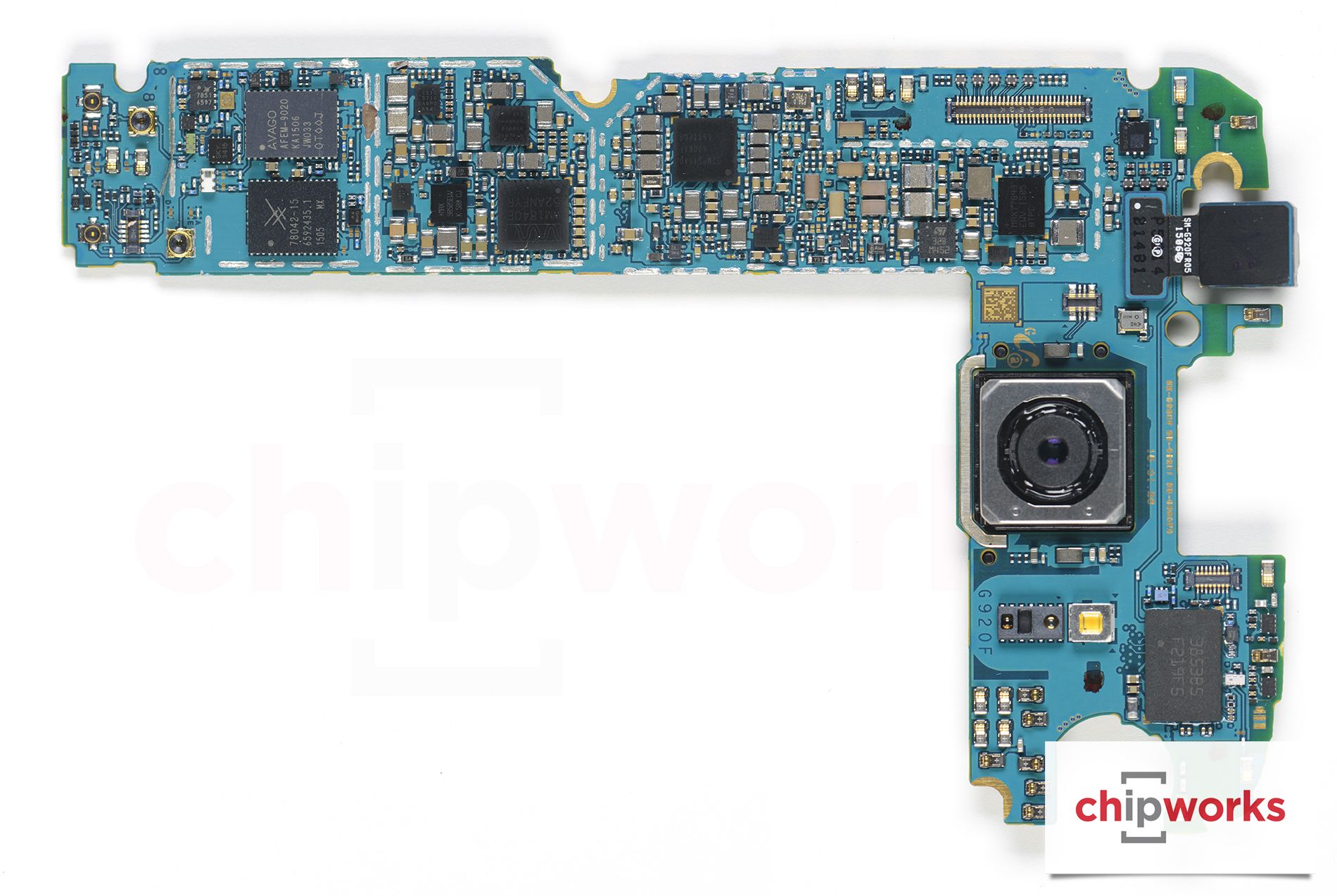Affiliate links on Android Authority may earn us a commission. Learn more.
(Update: not all versions) Samsung passed Qualcomm for the Galaxy S6 LTE modem too - report

Update, April 4: The WSJ cites a person familiar with the matter claiming that the model that Chipworks analyzed was designed for a specific carrier and that other versions of the Galaxy S6 feature Qualcomm modems. Qualcomm supposedly retains a “meaningful share” of the order.
Original post, April 3:
As we outlined in this post from earlier this week, Samsung stands to benefit substantially from adopting an in-house Exynos processor for the Galaxy S6 and S6 Edge, over the Snapdragon 810 chip from rival/partner/client Qualcomm. Now a new report from IC tech analysis firm Chipworks reveals that Samsung also adopted in-house solutions for the connectivity component of its new flagships.
Chipworks disassembled a Galaxy S6 and analyzed the circuitry and chips that make it tick. While the firm has only published preliminary findings so far, there are some interesting details to be gleaned from the following component list.
- Samsung Exynos 7420 SoC
- Samsung K3RG3G30MM-DGCH 3Gb LPDDR4 SDRAM and Samsung KLUBG4G1BD 32GB NAND Flash
- Samsung Shannon 333 Modem, Shannon 533 PMIC, Samsung S2MPS15 PMIC, Samsung Shannon 928 RF Transceiver and Samsung Shannon 710 Envelope Tracking IC
- Broadcom BCM4773 GNSS Location Hub
- InvenSense MPU-6500 Gyro + Accelerometer
- Skyworks SKY78042 Multimode Multiband (MMMB) Front-End Module (FEM)
- Avago AFEM-9020 PAM and Avago ACPM-7007 PAM
- Samsung C2N8B6 Image Processor
- Maxim MAX98505 Class DG Audio Amplifier and Maxim MAX77843 Companion PMIC
- Samsung Electro-Mechanics 3853B5 Wi-Fi Module
- N5DDPS2 (Likely Samsung NFC Controller (P/N needs to be confirmed)
- Wolfson WM1840 Audio CODEC
- Texas Instruments BQ51221 Single Chip Wireless Power Receiver
- Skyworks SKY13415 Antenna Switch
- STMicro FT6BH Touch Screen Controller
Even if you know little about electronics, a quick scan of the list tells you that the Galaxy S6 incorporates many components made by Samsung, including some of the most important ones. The application processor (SoC), the RAM memory, the flash storage, the LTE modem and the associated components, the image processor, and the Wi-Fi module are all Samsung, and herein lays one of Samsung’s biggest strengths. Unlike most other phone makers, Samsung is also making (either directly or through affiliate companies) many of the key components going inside its phones, which gives it more control and flexibility and allows it to work with higher profit margins.
The Galaxy S6 is Samsung's through and through
The chip analysis also shows that the SoC wasn’t the only “design loss” for Qualcomm, when it comes to the Galaxy S6. The modem, power management, RF transceiver, and envelope tracking chips are all from Samsung (Shannon is Samsung’s brand for various silicon components).
The design of cellular connectivity chips (branded Gobi) is Qualcomm’s other main activity, besides SoCs. It wouldn’t be the first time Samsung uses non-Qualcomm LTE chips for its phones; for instance, the Korean company opted for Intel chips for variants of the Galaxy Note 4 and Galaxy Alpha. Nonetheless, for Qualcomm, a design win in the connectivity stack would have helped soften the blow of losing the SoC spot. Especially since the Galaxy S6 will probably be Samsung’s best-selling device ever.
[related_videos align=”center” type=”custom” videos=”597711,595809,597284″]
Samsung appears to be doubling down on its component business, where it already holds a slight lead thanks to the 14-nm manufacturing process. The company is rumored to be preparing its own custom CPU cores, as well as a custom GPU, that would replace the current designs supplied by ARM. Samsung is also pushing hard to create competitive high-end SoCs with integrated LTE, following the launch of a mid-range integrated SoC last year.
Thank you for being part of our community. Read our Comment Policy before posting.